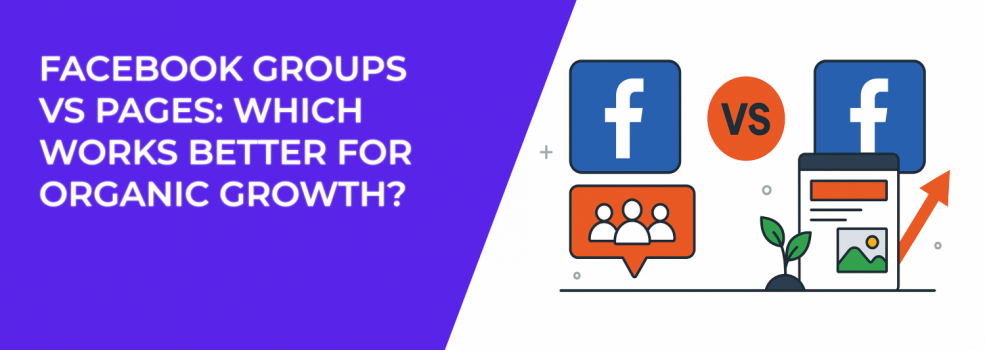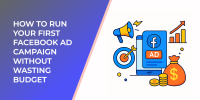You’re building a business. You know Facebook is still one of the top platforms for visibility. But as you go to set things up, you hit an unexpected decision — should you create a Facebook Page or a Facebook Group?
If you're like most marketers, you've probably asked this exact question. Pages seem like the obvious choice — after all, every brand has one. But then you hear that Groups get more engagement. That they build stronger communities. That they’re where organic reach still works.
So which is better for promoting a business, really?
You don’t want to invest time into the wrong format. You also don’t want to manage a dead Group with zero traction or run a Page no one sees unless you pay. The risk isn’t just wasted effort — it’s missing out on the growth your business could have had if you'd chosen differently.
Let’s unpack the differences and make it easy for you to decide.
What Facebook Pages Are Built For
Pages are your brand’s storefront on Facebook. They’re public, searchable, and necessary if you want to run paid ads or use Facebook’s full suite of business tools.
Here’s what a Facebook Page allows you to do:
-
Share branded content — including posts, videos, and event announcements.
-
Collect reviews and ratings — which helps build trust and social proof.
-
Set up call-to-action buttons — like “Book Now,” “Shop,” or “Send Message.”
-
Use Messenger integrations — to provide automated support or sales chats.
-
Run ad campaigns — through Facebook and Instagram using Meta Ads Manager.
All of this is useful if you're running ads or need a professional online presence. But here’s the downside: organic reach is nearly nonexistent unless you're spending.
Over the past few years, Facebook has deprioritized Page content in the feed. That means even your most loyal followers may never see your posts — unless you boost them. If you’ve been posting and getting silence, you’re not alone. It’s not a sign your content is bad — it’s the system.
If your Page engagement feels stuck, you might want to troubleshoot using our guide: Understanding Facebook Ad Statuses: Common Issues and How to Fix Them.
What Facebook Groups Are Designed For
Groups are built around conversation, not broadcasting. They're designed to create dialogue between members, not just deliver messages from a brand.
Here’s what you can do with a Facebook Group:
-
Build a niche community — around shared interests, goals, or values.
-
Encourage two-way engagement — where members can post, comment, and share ideas.
-
Create exclusivity — by making the Group private or invitation-only.
-
Establish thought leadership — by consistently showing up and sharing value.
-
Foster trust — through ongoing interaction and user-generated content.
Facebook's algorithm favors active Groups. Why? Because they keep people on the platform longer and encourage more interaction. If your Group is buzzing, Facebook will show it to more people. In contrast to Pages, the feed visibility here is earned, not bought.
For strategies that help maximize this organic advantage, check out: How to Build ‘No-CPC’ Warm Audiences Through Organic Facebook Activity.
Which One Should You Choose — Page or Group?
Both have their place — but they serve different roles.
Use a Facebook Page if you:
-
Need a professional, searchable brand presence
-
Plan to run Facebook or Instagram ads
-
Want access to features like CTAs, shops, and reviews
-
Care about search engine visibility (Pages are indexed by Google)
-
Are looking to scale visibility through paid campaigns
In short, Pages are foundational. Every business should have one, even if you also build a Group.
Use a Facebook Group if you:
-
Want to nurture a close-knit community
-
Plan to offer support, coaching, or educational content
-
Need real conversation — not just one-way promotion
-
Want members to engage with each other, not just you
-
Are focusing on organic reach and trust-building
Groups are your go-to when you're looking to build connection and loyalty. But they do require work — consistent posting, moderation, and meaningful interaction.
And here’s the best part: with LeadEnforce, you can actually target members of specific Facebook Groups in your ad campaigns. This allows you to reach warm, interest-based audiences that your competitors may be missing — even if those members haven’t interacted with your brand yet.
To better define what kind of audience you should aim for with either format, check out our full step-by-step guide to defining your target audience.
Should You Use Both?
Yes — and here's how they can complement each other without overlapping:
-
Use your Page to serve as the “public face” of your brand. Post regularly, run ads, and make it easy for new prospects to learn who you are.
-
Use your Group as the “inner circle.” Invite leads, customers, or fans to join for exclusive tips, content, and support.
-
Cross-promote between them. Drive Group traffic from your Page and vice versa. Share Group highlights in your Page posts to tease what members are missing.
Together, they create a funnel. Your Page brings people in. Your Group keeps them close. That combination is hard to beat.
For help reaching the right people through Facebook’s ad tools, read: Facebook Ad Targeting 101: How to Reach the Right Audience.
Tips for Growing a Facebook Group
Many Groups fail because they’re quiet, unfocused, or spammy. A thriving Group is more than just a place to post — it’s a space where people want to return.
Here’s how to build one that works:
-
Post consistently — aim for at least 3 to 4 posts per week.
-
Use questions and polls — to trigger real conversations.
-
Celebrate your members — spotlight wins, contributions, and stories.
-
Create value — with how-to posts, live Q&As, exclusive downloads, and behind-the-scenes looks.
-
Set and enforce clear rules — to avoid spam and off-topic noise.
Remember, a good Group feels like a curated conversation, not a chaotic feed. It requires moderation and leadership — but the payoff is loyalty, engagement, and deeper connection.
Need help making your Group visible to the right people? Start here: Get Your Facebook Group Noticed: Attract Members Who Actually Engage.
Final Take
Pages give you scale and professionalism. Groups give you connection and trust.
If you’re choosing one, make the decision based on your organic growth goals and capacity to lead a community. If you can manage both, use your Page to attract — and your Group to retain.
You don’t have to guess which path to take. You just need to define what kind of relationship you want with your audience — and what kind of effort you’re ready to sustain.
The right setup today can make all the difference in how your business grows tomorrow.

